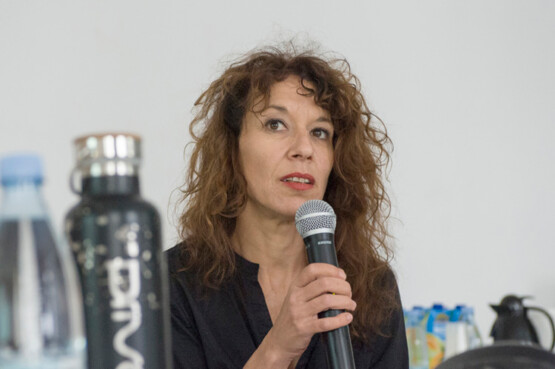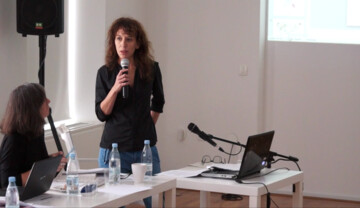bio | Galit Eilat is an independent curator, a writer and the founding director of The Israeli Center for Digital Art in Holon 2001 - 2010. She is the co-founder and was the chief editor of Maarav — an online arts and culture magazine 2004 – 2010. She served as a research curator at the Van Abbemuseum in Eindhoven 2010 – 2013 and Between 2012 – 2013 she was the President of the Akademie der Künste der Welt. Recently she co-curated the 31st Sao Paulo Biennial. Her projects tackle issues such as the geopolitical situation in the Middle East, activism and political imagination in art.
Selected curated and co-curated exhibitions: Yael Bartana, And Europe will be Stunned, Polish Pavilion in the International Art Exhibition in Venice, Italy. 2011; Akram Zaatari, This Day, Mala Galleria, Moderna Galleria Ljubljana, Slovenia. 2011; Politics of Collection, Collection of Politics, Van Abbemuseum, Eindhoven (2010); Sean Snyder, The Real War, The Israeli Center for Digital Art, Holon (2010); Evil to the Core, The Israeli Center for Digital Art, Holon (2009–2010); Never Looked Better, Museum Beth Hatefutsoth, Tel Aviv (2008–2009); Chosen, a joint collaboration between Wyspa Institute of Art, Gdańsk and The Israeli Center for Digital Art, Holon (2008–2009); Mobile Archive, in collaboration with Hamburg Kunstverein; Liminal Spaces, traveling seminar, Israel and Palestine (2006–2008); People, Land, State, The Israeli Center for Digital Art, Holon (2006); This is Not America, Art Project Gallery, Tel Aviv (2006).
An author of critical texts and contributed to many catalogues. she has published in periodicals such as Artpress, Ferieze, Vector Magazin, Lettre International. She is the editor of numerous books include, A CookBook For Political Imagination, co-editor, Zacheta National Gallery of Art. Sternberg Press 2011. Liminal Spaces, co-editor, The Israeli Center for Digital Art, Holon 2009. Never Looked Better, co-editor, Beth Hatefutsoth, Tel Aviv 2009.
Note: The biography describes the position of the narrator at the time of their participation in the Glossary of Common Knowledge. Given the long duration of the project, the narrator may have changed their respective position.



